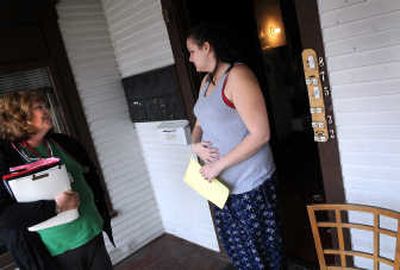Nurse-Family program aims to prevent abuse

Jessica Warren is just the person the Nurse-Family Partnership is looking for: a single, low-income, first-time mother-to-be with a lot of questions and no one else to turn to for answers.
Fortunately, a coalition of groups dedicated to preventing child abuse and neglect led by the Spokane Regional Health District last year secured one of three federal grants nationwide for the tried-and-true program to match women expecting their first baby with a public health nurse.
One day last week, Warren, 20, who is expecting a boy in August, sat in the living room of her downtown Spokane apartment and chatted with veteran public health nurse Merrylee Costello.
There was a lot to talk about, what with nausea, back pain, heartburn and all. Costello’s concern did not betray that she had heard Warren’s complaints from countless mothers before her.
“It’s what I love to do,” Costello said.
Warren said she wasn’t sure what she would do without Costello’s help. She recently lost her job at a pizza restaurant, she said, due to time lost because of her unintended pregnancy. Now she lives on $349 a month in Temporary Aid to Needy Families and the federal Women, Infants and Children supplemental food program. Her rent is $395 a month and she is behind on her utilities and other bills.
Costello advises Warren on how to find less expensive housing, as well as which prenatal vitamins to take.
“It’s very helpful (having Costello come to my home) rather than trying to go out and make appointments,” Warren said.
Spokane County tried to launch a nurse-family partnership program several years ago but was unable to secure funding. Of the three federal grants awarded last year, two went to programs in Washington. The Spokane region’s application was based largely on the communitywide Our Kids: Our Business program that debuted last year, a health district official said when the grant award was announced.
Since February, Costello and three other public health nurses have started visiting about two dozen patients, according to Elaine Conley, director of Community Family Services for the health district. When the program is up to full speed, 220 women will be seen by eight nurses.
Clients are referred by community health providers and First Steps, the state program that provides health and social services to low-income pregnant women.
The difference between the Nurse-Family Partnership and other programs such as First Steps is in the frequency, intensity and duration of nurses’ visits, Conley said.
A nurse begins seeing the client as early in the pregnancy as possible in order to change behaviors like smoking and prenatal care.
“We cannot accept referrals after the 28th week of pregnancy,” Conley said.
The nurse sees the client weekly for the first month, and then every other week until the baby is born. Once the baby comes, the nurse resumes weekly visits for the first month and then every other week until the child is 2 years old. Schedules can be adjusted if there are complications.
The results are as remarkable as they are well-documented.
Since the program began in New York in 1977, randomized, controlled trials have shown improved prenatal health, fewer childhood injuries, fewer subsequent pregnancies, increased intervals between births, increased maternal employment and improved school readiness. When they reached 15 years old, children born in the program were less often abused, neglected or arrested.
Extensive research has shown the Nurse-Family Partnership more than pays for itself in potential costs of social services and corrections.
To Warren, the Nurse-Family Partnership simply brings peace of mind.